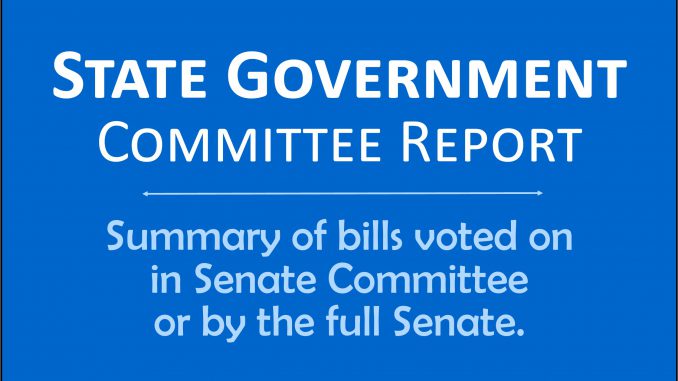
On this page
FLOOR ACTION:
SJR 2004 – Honey bee as state insect
SJR
2004 is joint resolution that designates the honeybee as the official
state insect of Iowa. The Iowa Official Register will include a picture of the
state insect, along with pictures of the state rock, state flower, state bird
and state tree.
[3/11: 46-0 (Excused: Breitbach, Brown,
Feenstra, Hogg)]
SF 2392 – Review agencies, licensing boards; new requirements for legislation
SF 2392 requires any legislator introducing a bill that would regulate, expand the scope of practice or increase continuing education requirements of a health profession to submit a report to the President of the Senate or Speaker of the House, addressing why the regulation/change/training is necessary, the efforts that have been made to address the problem, the alternatives considered, the benefits and harms to the public from regulation/change/training and the maintenance of professional standards. The report must describe expected costs of the regulation/change/training, and be submitted before the legislation is introduced. The report will be made public on the Legislature’s website.
The bill requires the State Government Efficiency Review Committee to review of all boards, commissions, councils and state agencies. The committee is required to meet monthly – as needed – and to submit recommendations in bill form by December 21 of each year. The bill maintains that political subdivisions cannot license an occupation that is not licensed in the state.
The bill requires the Administrative Rules Review Committee (ARRC), when reviewing a regulation, to consider certain factors specified in the bill. The ARRC will not give deference to a statement or interpretation made by a licensing board regarding any regulation, statute or other legal authority. If the ARRC disapproves of an entry regulation after consideration of the factors provided in the bill, the ARRC may take any action on the rule as their rules permit.
[3/10: 30-18, party line (Excused: Breitbach, Feenstra)]
SF 2391 – Prohibits paying of ransomware
SF 2391 prohibits the state or a city, county, township or school district from spending public money for ransomware attacks. The bill will allow the Office of the Chief Information Officer (OCIO) to pay a ransomware attack if the OCIO and Department of Homeland Security agree there is a critical or emergency situation. The bill also allows information related to any political subdivision’s purchase of ransomware insurance as a confidential record. There are still concerns about how this bill may tie the hands of local entities in an emergency/time-sensitive situation. There are additional concerns from some cities on how this prohibition impacts some of the ransomware insurance policies purchased by local municipalities.
An amendment was offered by Democrats that
kept the required reporting of all ransonware attacks to the state’s OCIO but
put together a task force of experts to study the various issues around ransomware
attacks and make policy recommendations to the Legislature by next year. The
bill doesn’t take effect until 2021 because there are still implementation
issues around this legislation. The amendment would have convened a task force
lead by the Department of Homeland Security to formulate comprehensive policy
recommendations instead of passing a bill that may have unknown and unintended
consequences and delay the effective date for a year.
[3/11: 28-17 (Excused: Breitbach, Brown, Feenstra, Hogg,
Zaun)]
